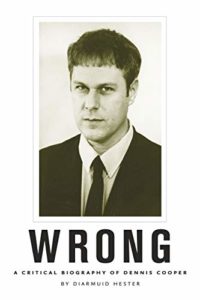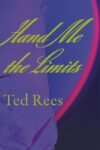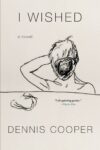
[University of Iowa Press; 2020]
It was something like 2016 and I was sitting at the big La Colombe in Fishtown, in Philadelphia, reading Dennis Cooper’s The Sluts when I realized I was going to pass out. It was something like Brad is getting castrated over the sink and being fed his balls, I think, and the first thing that happens when I’m about to pass out happens, which is I lost my hearing. There were red dots, like the world had gotten dry-shaved by a really bad razor, everywhere, and I had about 15 seconds to get to the bathroom. I went into a stall and slumped on the toilet and fully passed out. I returned to my table, where The Sluts was splayed in that way, and my cortado, and kept reading. I passed out again, but this time with more of a warning. 30 seconds. I went back to the bathroom. I came back out. I finished The Sluts in Fishtown.
I’ve since really wanted to teach The Sluts (Cooper’s 2005 novel-complex of gay male escort reviews) in a class on 9/11 fiction I don’t really want to teach. Because all of these website reviews — speculations and possible reports on interactions with an elusive nothing-like twink named Brad — are written between June 2001 and May 2002. It’s like this huge thing happened that changed the world but you’d never know, everyone’s wondering about the whereabouts of Brad’s asshole. Which seemed to me to say, there are many centers. And the world changes a lot, all of the time, or it does not, ever. Split the difference.
Flash backwards to my first semester in MFA school, 2007, where I’ve just shown the workshop a story about a man who kills a different animal each in a different town in Pennsylvania. Altoona. Intercourse. Philadelphia. I tell my students about this now, about what the workshop wanted me to do with it. There must be a reason for all of this, the workshop said. It said, What’s wrong with him? What happened? I tell my students how you can’t always listen to comments, but really, more, you can’t always give (or have) reasons, but I ruined that story. I wrote in an alcoholic parent because maybe an adult child of an alcoholic would go around doing this? I have no idea. I don’t think art is about reasoning things out. And at the time I had little backup. I hadn’t read enough, and I didn’t read Dennis Cooper, really, until I had a conversation with Diarmuid Hester in 2014 after he reviewed my first novel, here.
And this is his first book, so here I am.
Wrong: A Critical Biography of Dennis Cooper is riproaring and adventuresome and shines at its absolute brightest when it works out some cultural anthropologies of queer, punk, anarchist, and literary scenes, cherishing and revealing them, as it works out problems of individualism, alienation, dissociation and automatism, that necessarily animate within (or at least against) communion. Cooper, himself an adult child of an alcoholic (was that him, ripping the neck out of an ostrich in Altoona??), often becomes like a beacon in these different communities and perhaps most overtly with his blog has created his own hive of zesty generativity.
Like a great vampyr story, Wrong pools into different scenes, eras, as Cooper touches down, with this kind of swiftness and vastness, seemingly everywhere: the punk poetry scene in ’80s LA, New Narrative’s second wave (argued by Hester as one ushered in by Cooper’s aesthetics of distance, and his disinterest in exalting gay culture), Queercore, the downtown New York arts scene, on to puppetry in Paris, and into the digital plane. Hester writes, “The way Cooper embraces independence and commits himself to community building at the same time seems somewhat paradoxical.” He contends that the ideas of anarchist intellectual Paul Goodman might be a starting place for holding on to this complication:
The essential aim of our advance-guard must be the physical re-establishment of community. This is to solve the crisis of alienation in the simple way. If the persons are estranged from one another, from themselves, and from their artist, he takes the initiative precisely by putting his arms around them and drawing them together. In literary terms this means: to write for them about them personally, and so break the roles and format they are huddled in.
Goodman writes about the ideal of an “intimate community” where “everybody knows everybody and understands what is at stake.” Cooper has gone out of his way to foster such ideals (which are never ideal), through his LA reading series Beyond Baroque (Kate Braverman physically attacks him onstage), mentorships (some perilous, like with Laura Albert/JT LeRoy), collaborations with artists like Gisèle Vienne and Zac Farley, and through his blog (infamously censored/shut down by Google). Hester describes, about this blog (now on its own domain), a technics of “intimate community,” including Cooper’s commitment to replying to every single commenter (which Cooper has said takes him 3-5 hours each morning).
This calls up, for me, the importance of independent publishing, and I watched, as I read Wrong, curiously as Cooper swings between indie presses and becoming a Grove author, beginning in 1989. At the time he occupied that list with his contemporary Kathy Acker; look out for an August release from Candace Bushnell. As Hester delicately and painstakingly holds this paradox between community and independence, ultimately arguing that Cooper’s work acknowledges a fundamental isolation while making gestures, tries, for communion, I feel there is another paradox at stake, as well, that of knowing everybody, understanding what is at stake, and going big. And it is perhaps in this bigness, or as Cooper puts it, his desire to publish with “the majors” that creates, in my mind, a demand for reasons in the first place.
Why is his work so violent? Why do these boys seem so dead inside?
Or maybe I mean this interest in redemption — the try. Is it ultimately important that Cooper’s readers know that his seemingly deadened and not great and a lot of the times serial killer narrators or characters are trying to, like, commune? Who needs that to be the case? I’m more enlivened by Hester’s happymaking connectivity, that drains these characters of choice, motive, heart, arc (workshop stuff) as we begin to see the shape, the machine, the historicity of the work, “Like Faulknerian voices circling the corpse of Addie Bundren in As I Lay Dying (1930), members of the ‘escort-loving community’ depicted in The Sluts all orbit the text’s Brad-shaped lacuna.”
Cooper himself makes many direct appearances in this text, as this is a critical biography wrought from a long engagement, fandom, and a friendship with him. Hester speaks with Cooper about his relationship with George Miles, prompting the George Miles cycle of novels, which reads as compelling, heartbreaking, and also reserved. This is not a biography seeking to rummage in all corners of Cooper’s life and it resists any impulse to describe the content of his work via his own relationship to sex, which simultaneously feels like a loss (much of Cooper’s work to me reads like this kink being ironed out across epochs of projects, this kink that supersedes and demolishes politics, monotonously, the way it rights itself) and totally reasonable, or in Cooper’s own words, from his blog, as quoted by Hester: “ — Sex. (n.o.y.b., m.f.).”
When Cooper speaks for his own work, it’s often in a plain and direct manner, and strikes me as incredibly confident. I imagined myself in that 2007 workshop saying, “No, actually this is what I’m trying to do.” What would I have said if I actually knew that?
Acker wrote to Cooper in 1981 to say that “although your poetry is clear and beautiful, the sameness of themes and the theme itself puts me off.” Cooper wrote a thoughtful reply, reading in part:
I’m very interested in people incapable of saying what they mean or feel and instead forced to act in unsatisfying broad gestures which satisfy no one but give them what they must have in the only way they know how to get it. This idea and aesthetic is, by its nature, I guess pretty depressing. But it feels appropriate to what I want to convey about people and things, and appropriate to the lives and feelings I see around me now . . . It can seem, in the case of my work, overly depressing, so much so that the reader is repelled in some way. But it is, I firmly believe, the best way I can, within my particular skills, do what I want to do best.
Wrong has an ethical mode as Hester takes some care to historicize and condemn problematic instances, which he does compassionately and forcefully. There are the despicable Black Mountain poets Ed Dorn and Tom Clark who, in 1983, give out an “AIDS Awards for Poetry” to those they deemed “idiotic,” to people like Allen Ginsburg, Steve Abbott, and Cooper. Eliot Weinberger wrote about it at the time, “It has only one reading: if AIDS is ‘idiocy,’ then clearly the ‘idiots’ are AIDS-victims — that is, gay men. For Cooper, Ginsberg, and Abbott, who are publicly known as homosexual, it means: Those faggots should drop dead.” And then there’s Laura Albert, known for creating the literary hoax of JT LeRoy. Cooper was an initial mark for her ploy and he, and others, were taken in by this story of a young gay teenage fan and writer who was supposedly HIV positive. Unlike other people who have committed line-crossing hoaxes (pretending you’re an indigenous person or a Holocaust survivor), Albert continues to draw money and interest in her brand. Hester puts that right in its place:
Albert’s books were edited, drafted, redrafted, and published by people who gave their time and expertise to her for free because they thought they were working with a teenager who was dying of AIDS. Why should Albert be permitted to continue making money from this con? . . . Is the experience of people living with HIV/AIDS and those who survived the AIDS epidemic somehow less important, or is it that cultural amnesia around AIDS and its effects is now so widespread that Laura Albert’s grift doesn’t utterly disgust and appall? . . . As revealing as the JT LeRoy hoax was of the culture LeRoy moved in, the rehabilitation of Laura Albert and her continued success perhaps teaches us even more about American society and how a proper reckoning with the devastation and injustice of the plague years is long overdue.
Hester’s critical biography is necessarily so polyvocal, and readers will be delighted by the tripwires of many voices, like those of Acker, Killian, Koestenbaum, Deleuze and Guattari, Sedgwick, major influences like Sade, Rimbaud, Robbe-Grillet and Bresson. And John Waters makes two stupendous appearances one of which I will give right away, his review of Cooper’s 2016 film with Zac Farley Like Cattle Towards Glow: “Arty teenage death, Gallic rimming, and a maddening passion for punk penises make this Eric Rohmer-like porno a real French tickler for the fucked up literary set.” I think you should definitely buy this book and find the other.
Caren Beilin is an Editor-at-Large at Full Stop and the author of a book length essay, Blackfishing the IUD, a novel, The University of Pennsylvania, and some short fictions, Americans, Guests, or Us. She teaches creative writing at Massachussets College of Liberal Arts.
This post may contain affiliate links.







